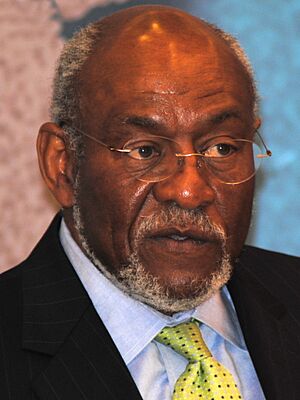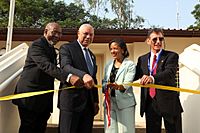Johnnie Carson facts for kids
Quick facts for kids
Johnnie Carson
|
|
|---|---|
 |
|
| 16th United States Assistant Secretary of State for African Affairs | |
| In office May 7, 2009 – March 29, 2013 |
|
| President | Barack Obama |
| Preceded by | Jendayi Frazer |
| Succeeded by | Linda Thomas-Greenfield |
| United States Ambassador to Kenya | |
| In office September 23, 1999 – July 6, 2003 |
|
| President | Bill Clinton George W. Bush |
| Preceded by | Prudence Bushnell |
| Succeeded by | William M. Bellamy |
| United States Ambassador to Zimbabwe | |
| In office April 20, 1995 – July 25, 1997 |
|
| President | Bill Clinton |
| Preceded by | Edward G. Lanpher |
| Succeeded by | Tom McDonald |
| United States Ambassador to Uganda | |
| In office September 18, 1991 – August 9, 1994 |
|
| President | George H. W. Bush Bill Clinton |
| Preceded by | John A. Burroughs, Jr. |
| Succeeded by | E. Michael Southwick |
| Personal details | |
| Born | April 7, 1943 Chicago, Illinois, U.S. |
| Children | 3 |
| Residences | Reston, Virginia, U.S. |
| Profession | Diplomat |
Johnnie Carson (born April 7, 1943) is an American diplomat. A diplomat is someone who represents their country in other nations. He worked as the United States Ambassador to several countries in Africa. In 2009, President Barack Obama chose him to be the U.S. Assistant Secretary of State for African Affairs. This important job meant he helped guide America's relationships with African countries. He left this role in 2013. Today, he is a Senior Advisor at the Albright Stonebridge Group, which helps businesses and governments work together.
Contents
Who is Johnnie Carson?
Early Life and Education
Johnnie Carson was born on April 7, 1943, in Chicago, Illinois. He is married and has three children. His home is in Reston, Virginia.
He went to Drake University and earned a degree in History and Political Science in 1965. Later, in 1975, he received a Master's degree in International Relations from the School of Oriental and African Studies at the University of London.
Before becoming a diplomat, Carson was a Peace Corps volunteer. He lived and worked in Tanzania from 1965 to 1968, helping people in that country.
A Career in Diplomacy
Johnnie Carson had a long and successful career in the U.S. Foreign Service, which lasted 37 years. The Foreign Service is a group of people who work for the U.S. government in other countries.
He served as the United States Ambassador to three different African nations:
He also held other important roles. From 1997 to 1999, he was the Principal Deputy Assistant Secretary for the Bureau of African Affairs. This bureau helps manage U.S. relations with African countries.
Earlier in his career, he worked in Portugal, Botswana, Mozambique, and Nigeria. He also worked in Washington D.C. at the State Department and for the U.S. House of Representatives.
Awards and Recognition
Johnnie Carson received several awards for his excellent work. The Department of State gave him "Superior Honor Awards." He also received a "Meritorious Service Award" from Secretary of State Madeleine Albright.
The Centers for Disease Control (CDC) gave him their highest award, the "Champion of Prevention Award." They recognized his leadership in fighting HIV/AIDS in Kenya. When he left his role as Assistant Secretary, ambassadors from ECOWAS countries praised him. They thanked him for his efforts to strengthen ties between the United States and their nations.
Leading African Affairs

In March 2009, President Barack Obama nominated Johnnie Carson to be the U.S. Assistant Secretary of State for African Affairs. This was a very important job. He was responsible for guiding U.S. policy and relationships with countries across Africa.
He served in this role for four years. In February 2013, he spoke about the Kenyan elections. He said that while the U.S. was not officially supporting any candidate, "choices have consequences."
In March 2013, it was announced that Carson would be stepping down from his position. After leaving the State Department, he joined the United States Institute of Peace as a senior adviser in May 2013. He also serves on the Board of Directors for the National Democratic Institute.
In January 2015, he encouraged the U.S. and European countries to work more closely with Nigeria. He believed this was important to help Nigeria stay stable. This was especially true because of the 2015 Nigerian general election, security issues in northeastern Nigeria, and concerns about oil prices.
 | Aurelia Browder |
 | Nannie Helen Burroughs |
 | Michelle Alexander |

